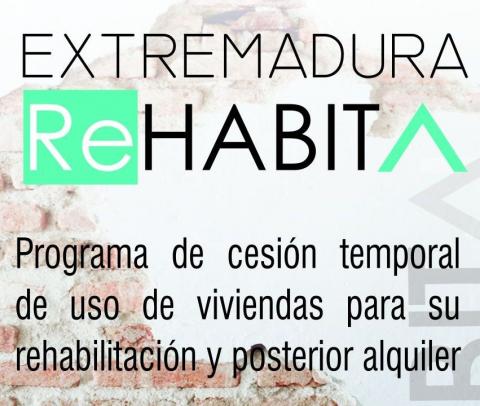‘Rehabita’ programme for the rehabilitation of rental housing

About this good practice
REHABITA consists of the transfer of ownership of a dwelling to the Junta de Extremadura for a period in exchange for the Autonomous Administration to renovate it and rent it.
The objectives of this pilot, with an initial budget of 635,851€ to renovate houses in the municipalities of Olivenza, Madroñera, Garrovillas, Alconchel, Casar de Cáceres, and Guareña, are to increase the supply of affordable rental with the recovery of empty houses, improve urban environments, and carry out energy efficient rehabilitation.
At the same time, it seeks to generate employment, contribute to COVID economic recovery, and combat energy poverty, in addition to reducing CO2 emissions. This will also enable the occupation of rural areas now that teleworking makes possible the decongestion of cities.
Through the assignment of the usufruct of the house to URVIPEXSA, the public company will undertake the necessary renovation works, with criteria of EE and accessibility, and will prepare the administrative procedures to make them available to the public on a rental basis at affordable prices.
In exchange for these interventions in this empty residential park, URVIPEXSA will exploit the houses during the agreed time of transfer of usufruct (between 5-15 years) as well as pay the corresponding taxes, process the subsidies for rehabilitation, and assume the insurance, conservation, and maintenance.
If it this pilot is successful, it will be transferred to the entire region.
Expert opinion
It is estimated that there are some 11 million empty homes in Europe, with more than 3 million of these being in Spain. Bringing these back into use would contribute significantly to providing affordable housing and also improving the overall quality of neighbourhoods. Additionally, renovation is more resource efficient and less costly than building new homes. This is a very interesting practice for renovation of empty homes, with the public authority taking leadership. As well as providing housing, the economic and employment benefits are also clear. The results will be interesting to see!
Resources needed
635,851 euros
Evidence of success
This programme was launched in last August in 9 municipalities. After the conclusion of the call, 29 proposals were received but 20 have been rejected, so the available credit will not be exhausted. Hence, another call will be made in municipalities with similar characteristics as they have expressed their interest to access the pilot programme.
Potential for learning or transfer
REHABITA is a good example of how to face the COVID-19 crisis in several ways:
1. Fixing the population in the territory ("re-inhabit"). Increasing the offer of affordable rental houses in small municipalities, enabling the decongestion of the main cities, and occupying rural areas which is possible due to teleworking opportunities.
2. Renovating the empty residential park, reducing CO2 emissions, and fighting energy poverty with affordable rental prices.
3. Contributing to the economic recovery and generating employment.
Further information
Images


